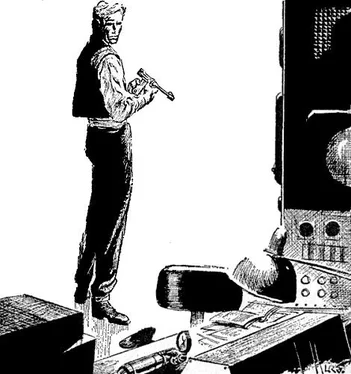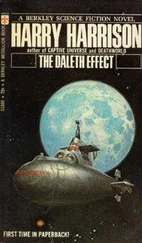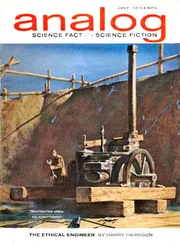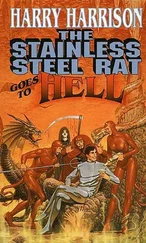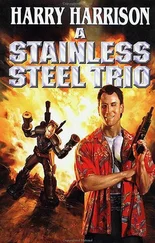Harry Harrison - The K-Factor
Здесь есть возможность читать онлайн «Harry Harrison - The K-Factor» весь текст электронной книги совершенно бесплатно (целиком полную версию без сокращений). В некоторых случаях можно слушать аудио, скачать через торрент в формате fb2 и присутствует краткое содержание. Жанр: Фантастика и фэнтези, на английском языке. Описание произведения, (предисловие) а так же отзывы посетителей доступны на портале библиотеки ЛибКат.
- Название:The K-Factor
- Автор:
- Жанр:
- Год:неизвестен
- ISBN:нет данных
- Рейтинг книги:5 / 5. Голосов: 1
-
Избранное:Добавить в избранное
- Отзывы:
-
Ваша оценка:
- 100
- 1
- 2
- 3
- 4
- 5
The K-Factor: краткое содержание, описание и аннотация
Предлагаем к чтению аннотацию, описание, краткое содержание или предисловие (зависит от того, что написал сам автор книги «The K-Factor»). Если вы не нашли необходимую информацию о книге — напишите в комментариях, мы постараемся отыскать её.
The K-Factor — читать онлайн бесплатно полную книгу (весь текст) целиком
Ниже представлен текст книги, разбитый по страницам. Система сохранения места последней прочитанной страницы, позволяет с удобством читать онлайн бесплатно книгу «The K-Factor», без необходимости каждый раз заново искать на чём Вы остановились. Поставьте закладку, и сможете в любой момент перейти на страницу, на которой закончили чтение.
Интервал:
Закладка:
"No, I don't mean you. If I did, I would say so. Your worst fault—if you can call it a fault, since it is the very thing we have been trying to bring about—is that you have a very provincial attitude towards the universe. Now is the time to re-examine some of those ideas. Firstly, what do you think the attitude of the UN is towards Societics?"
There was no easy answer, Neel could see traps ready for anything he said. His words were hesitant. "I can't say I've really ever thought about it. I imagine the UN would be in favor of it, since we make their job of world government that much easier—"
"No such thing," Abravanel said, tempering the sharpness of his words with a smile. "To put it in the simplest language, they hate our guts. They wish I had never formulated Societics, and at the same time they are very glad I did. They are in the position of the man who caught the tiger by the tail. The man enjoys watching the tiger eat all of his enemies, but as each one is consumed his worry grows greater. What will happen when the last one is gone? Will the tiger then turn and eat him?
"Well—we are the UN's tiger. Societics came along just at the time it was sorely needed. Earth had settled a number of planets, and governed them. First as outposts, then as colonies. The most advanced planets very quickly outgrew the colony stage and flexed their independent muscles. The UN had no particular desire to rule an empire, but at the same time they had to insure Earth's safety. I imagine they were considering all sorts of schemes—including outright military control—when they came to me.
"Even in its early, crude form, Societics provided a stopgap that would give them some breathing time. They saw to it that my work was well endowed and aided me—unofficially of course—in setting up the first control experiments on different planets. We had results, some very good, and the others not so bad that the local police couldn't get things back under control after a while. I was, of course, happy to perfect my theories in practice. After a hundred years I had all the rough spots evened down and we were in business. The UN has never come up with a workable alternative plan, so they have settled down to the uncomfortable business of holding the tiger's tail. They worry and spend vast sums of money keeping an eye on our work."
"But why ?" Neel broke in.
"Why?" Abravanel gave a quick smile. "Thank you for fine character rating. I imagine it is inconceivable to you that I might want to be Emperor of the Universe. I could be, you know. The same forces that hold the lids on the planets could just as easily blow them off."
Neel was speechless at the awful enormity of the thought. Abravanel rose from behind his desk with an effort, and shambled over to lay a thin and feather-light arm on the younger man's shoulders. "Those are the facts of life my boy. And since we cannot escape them, we must live with them. Costa is just a man doing his duty. So try and put up with him. For my sake if not for your own."
"Of course," Neel agreed quickly. "The whole thing takes a bit of getting used to, but I think I can manage. We'll do as good a job on Himmel as it is possible to do. Don't worry about me, sir."
Costa was waiting in the next room, puffing quietly on a long cigarette. They left together, walking down the hall in silence. Neel glanced sideways at the wiry, dark-skinned Brazilian and wondered what he could say to smooth things out. He still had his reservations about Costa, but he'd keep them to himself now. Abravanel had ordered peace between them, and what the old man said was the law.
It was Costa who spoke first. "Can you brief me on Himmel—what we'll find there, and be expected to do?"
"Run the basic survey first, of course," Neel told him. "Chances are that that will be enough to straighten things out. Since the completion last year of the refining equations of Debir's Postulate, all sigma-110 and alpha-142 graph points are suspect—"
"Just stop there please, and run the flag back down the pole." Costa interrupted. "I had a six-months survey of Societics seven years ago, to give me a general idea of the field. I've worked with survey teams since then, but I have only the vaguest idea of the application of the information we got. Could you cover the ground again—only a bit slower?"
Neel controlled his anger successfully and started again, in his best classroom manner.
"Well, I'm sure you realize that a good survey is half the problem. It must be impartial and exact. If it is accurately done, application of the k-factor equations is almost mechanical."
"You've lost me again. Everyone always talks about the k-factor, but no one has ever explained just what it is."
Neel was warming to his topic now. "It's a term borrowed from nucleonics, and best understood in that context. Look, you know how an atomic pile works—essentially just like an atomic bomb. The difference is just a matter of degree and control. In both of them you have neutrons tearing around, some of them hitting nuclei and starting new neutrons going. These in turn hit and start others. This goes on faster and faster and bam , a few milliseconds later you have an atomic bomb. This is what happens if you don't attempt to control the reaction.
"However, if you have something like heavy water or graphite that will slow down neutrons and an absorber like cadmium, you can alter the speed of the reaction. Too much damping material will absorb too many neutrons and the reaction will stop. Not enough and the reaction will build up to an explosion. Neither of these extremes is wanted in an atomic pile. What is needed is a happy balance where you are soaking up just as many neutrons as are being generated all the time. This will give you a constant temperature inside the reactor. The net neutron reproduction constant is then 1. This balance of neutron generation and absorption is the k-factor of the reactor. Ideally 1.0000000.
"That's the ideal, though, the impossible to attain in a dynamic system like a reactor. All you need is a few more neutrons around, giving you a k-factor of 1.00000001 and you are headed for trouble. Each extra neutron produces two and your production rate soars geometrically towards bang. On the other hand, a k-factor of 0.999999999 is just as bad. Your reaction is spiraling down in the other direction. To control a pile you watch your k-factor and make constant adjustments."
"All this I follow," Costa said, "but where's the connection with Societics?"
"We'll get to that—just as soon as you realize and admit that a minute difference of degree can produce a marked difference of kind. You might say that a single, impossibly tiny, neutron is the difference between an atom bomb and a slowly cooling pile of inert uranium isotopes. Does that make sense?"
"I'm staggering, but still with you."
"Good. Then try to go along with the analogy that a human society is like an atomic pile. At one extreme you will have a dying, decadent culture—the remains of a highly mechanized society—living off its capital, using up resources it can't replace because of a lost technology. When the last machine breaks and the final food synthesizer collapses the people will die. This is the cooled down atomic pile. At the other extreme is complete and violent anarchy. Every man thinking only of himself, killing and destroying anything that gets in his way—the atomic explosion. Midway between the two is a vital, active, producing society.
"This is a generalization—and you must look at it that way. In reality society is infinitely complex, and the ramifications and possibilities are endless. It can do a lot more things than fizzle or go boom. Pressure of population, war or persecution patterns can cause waves of immigration. Plant and animal species can be wiped out by momentary needs or fashions. Remember the fate of the passenger pigeon and the American bison.
Читать дальшеИнтервал:
Закладка:
Похожие книги на «The K-Factor»
Представляем Вашему вниманию похожие книги на «The K-Factor» списком для выбора. Мы отобрали схожую по названию и смыслу литературу в надежде предоставить читателям больше вариантов отыскать новые, интересные, ещё непрочитанные произведения.
Обсуждение, отзывы о книге «The K-Factor» и просто собственные мнения читателей. Оставьте ваши комментарии, напишите, что Вы думаете о произведении, его смысле или главных героях. Укажите что конкретно понравилось, а что нет, и почему Вы так считаете.
